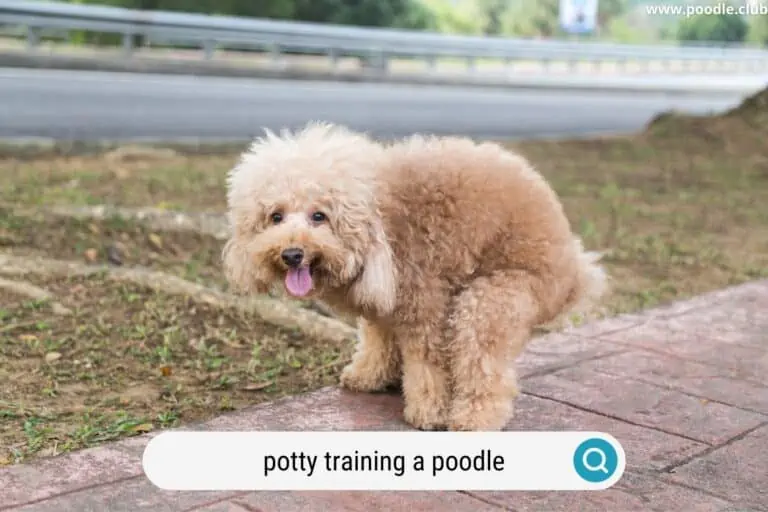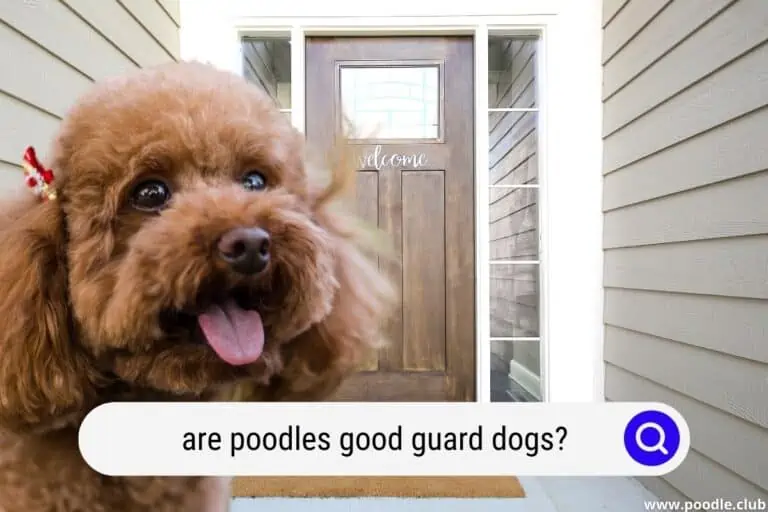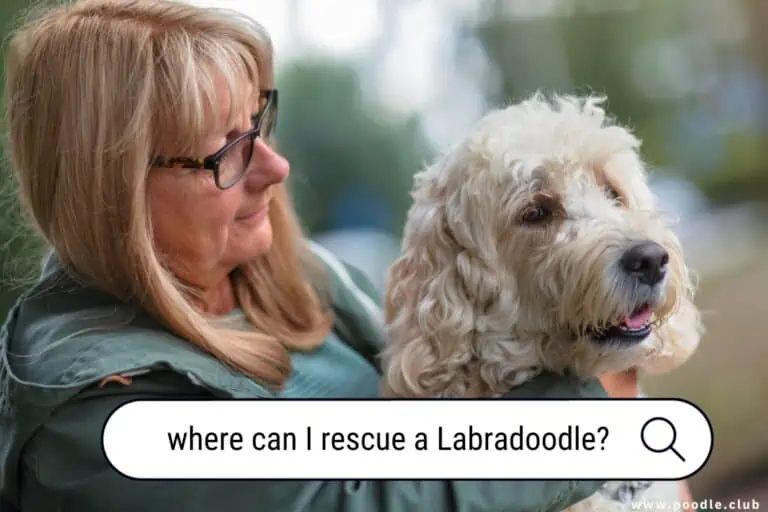Do Poodles Get Separation Anxiety?
Poodles are intelligent, comedic dogs with a deep sense of loyalty. They love their owners and enjoy spending time with them.
Your Poodle would love nothing better than for you to spend all day, every day with them. Regrettably, that’s not always practical or possible.
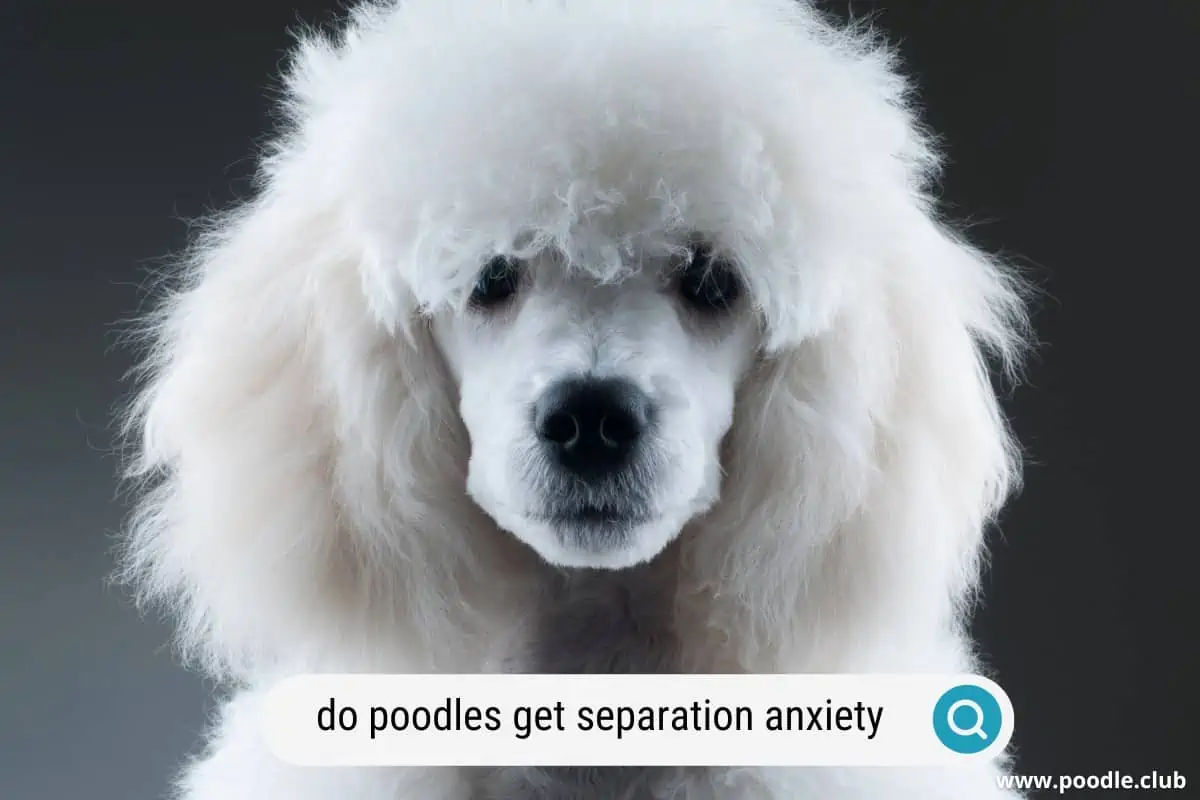
So, do Poodles get separation anxiety? Depending on how active your Poodle stays while you are out, this time apart can cause Poodles to develop separation anxiety.
Spotting Signs of Poodle Separation Anxiety
Since the only way to treat separation anxiety is to identify it, you need to recognize the symptoms of Poodle separation anxiety.
Excessive and Constant Barking
Even when Poodles aren’t anxious, they have no perception of time. That makes it impossible for them to estimate if you disappeared for five minutes or five years.

A well-trained Poodle can be relied on to entertain itself while you’re out. They may sleep or indulge in independent play.
An anxious Poodle who is unsure when they will see you again channels that energy into barking. It’s common for the barking to start as soon as you leave the house, and depending on the severity of the anxiety, it may continue until you return.
PuppySpot is a reputable dog marketplace where you can browse and find compatible puppies right from the comfort of your home. They have placed over 200,000 puppies into homes in the US!
Inappropriate Chewing
Among other things, Poodles are people-pleasers. For that reason, they are highly trainable dogs.
It usually takes days or weeks to condition a Poodle puppy not to gnaw the rug or munch a chair leg.
When a trained Poodle reverts to chewing objects they shouldn’t, it can indicate that a Poodle has separation anxiety.
Inappropriate Elimination
Similarly, another early warning of Poodle separation anxiety is inappropriate elimination.
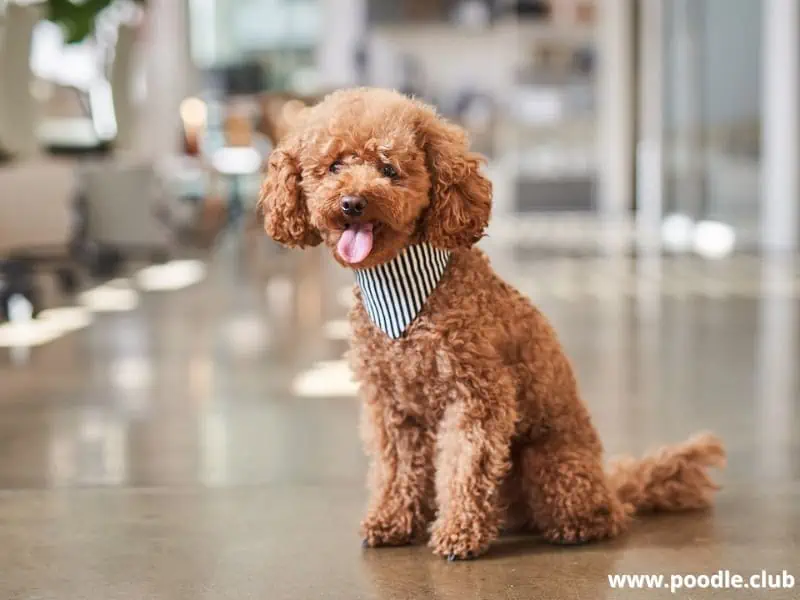
Dogs can’t communicate with words, so they find other ways of letting you know they’re unhappy. Peeing or pooing in the house is an effective way to do that.
And while you may not appreciate the behavior, from the Poodle’s perspective, it has the bonus of getting your attention immediately. For a Poodle suffering from Separation anxiety, that’s important because the thing they want most is your undivided attention, even if the outcome is negative.
Depression
Scientists still debate if dogs have emotions. But one thing is certain; dogs can and do experience depression.
Like people, an anxious dog may exhibit signs of depression, like:
- Lethargy
- Loss of appetite
Poodle separation anxiety exhibited through depression can include a sudden disinterest in a favorite toy or reluctance to go on walks. Since Poodles are high-energy dogs, this should be taken as a sign something is wrong.
Crying or Whining
Another classic sign of Poodle separation anxiety is crying or whining when you leave for work.
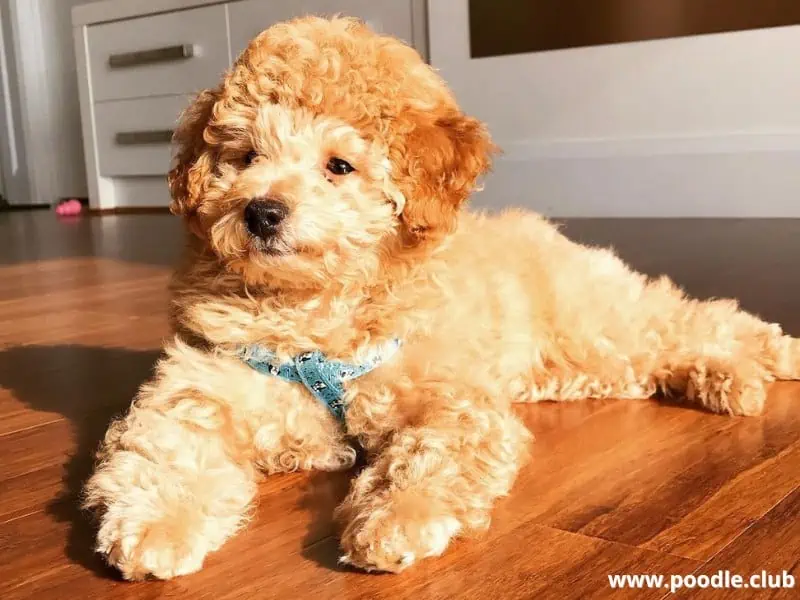
It’s common for your Poodle to circle or pace while crying. They may hover by the doorway and try to prevent you from leaving.
Your Poodle may repeat this behavior when you return home from work. That is also normal. When our dog suffered from separation anxiety, they let us leave the house without issue but whined incessantly when we returned.
Overexcitement When You Leave or Re-Enter the House
Another facet of the circling or whining separation anxiety produced in Poodles is overexcitement surrounding your departure or return home.
These overexcited reunions look like more than a Poodle’s normal enthusiastic greeting. They may:
- Leap
- Bark
- Urinate
These are all classic signs of overexcitement. It’s also possible that an anxious Poodle won’t settle until they have had a cuddle or other demonstration of affection from you.
What Causes Poodle Separation Anxiety?
So, that’s what to watch for when trying to diagnose an anxious Poodle. But what causes canine separation anxiety in the first place?

Surprisingly, it isn’t always as simple as your daily commute. Common causes of separation anxiety include:
- Death of a family member (animal or human)
- Moving house
- New family member (animal or human)
- Long periods alone/unsocialized
Will Another Dog Help My Poodle’s Anxiety?
It’s tempting to think that a bit of canine company will solve your separation anxiety problem.
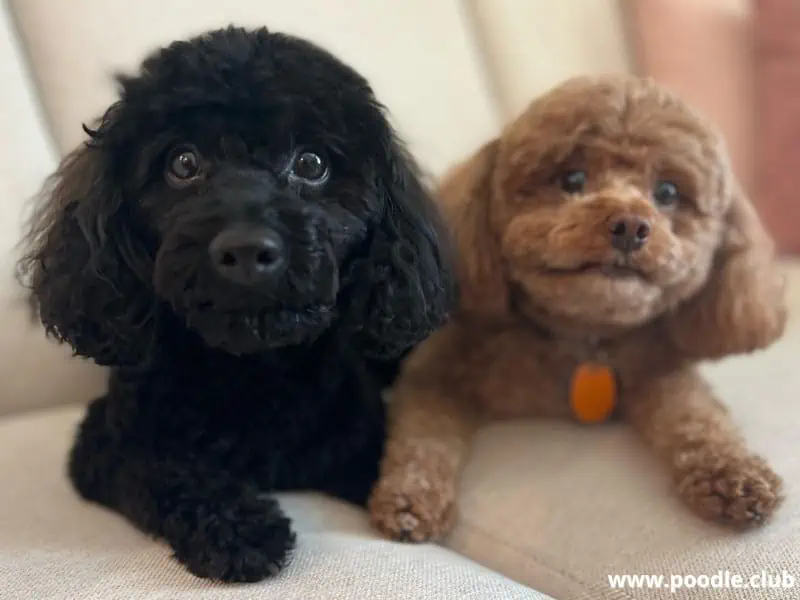
It’s especially tempting to think like this if you recently lost a dog. But, like people, a lot depends on how the individual Poodle processes loss.
Adding another animal to your family too quickly could compound the separation anxiety triggered by the recent loss. That’s because, in addition to feeling lonely, your Poodle is now anxious you are replacing them with the new dog. That can make their separation anxiety worse.
In the worst-case scenario, your Poodle’s separation anxiety can get passed on to the new dog, leaving you with two anxious animals.
Managing Poodle Separation Anxiety
If not a new dog, what can you do instead? There are various ways to manage Poodle separation anxiety.
Pheromone Dispensers
Since dogs have notoriously imperfect eyesight, they rely heavily on the sensory feedback provided by their noses. It’s why Poodles love a romp through a fetid swamp or rolling in decomposing fish.

Another scent dogs seek out is pheromones. These are scent markers found in:
- Saliva
- Scent glands
- Anal glands
Poodles leave pheromones behind whenever they rub against you or the furniture. Since dogs use them to mark or claim territory, they find them naturally reassuring. It helps them feel in control of environments and situations.
What synthetic pheromone dispensers do, is release imitation pheromones that help calm anxious dogs. They trick your dog into feeling there are more of their pheromones in an environment than is the case. That, in turn, mitigates some of their anxiety-induced behavior, like:
- Inappropriate chewing
- Eliminating indoors
Hire a Dog Walker
Another effective way to manage an anxious Poodle is by getting them out of the house.
A regular dog walker is ideal for lessening anxiety because it provides your Poodle with a way to expend their natural energy without destroying their home. It also ensures they can do their peeing and pooping outdoors.
It also gives your Poodle a chance to socialize with other dogs, which is an excellent way to mitigate anxiety.
That’s because socialization gives Poodles a healthy outlet for play and enables them to bond with other people and animals. Additionally, it reduces the time your dog spends alone and, by extension, decreases their boredom.
Consider Environmental Enrichment
One of the things that exacerbate separation anxiety for Poodles is boredom.
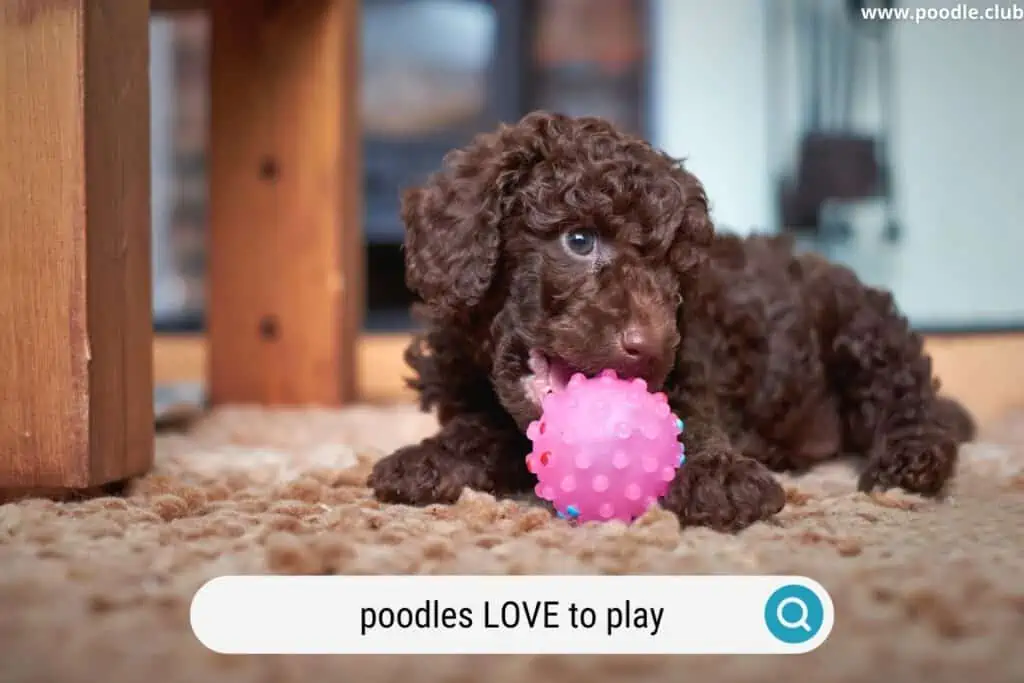
A Poodle with no understanding of independent play seeks other ways to keep themselves entertained, and that can lead to destructive behavior like:
- Carpet chewing /scratching
- Furniture chewing
For food-motivated Poodles, puzzle toys can be an excellent diversion. Even better, these toys don’t need to be expensive. You can improvise one with a cardboard box and a favorite treat.
Keep in mind that while Poodles train easily, they won’t figure out independent play without a bit of guidance. Make sure you spend some time teaching them how to play with enrichment toys until they get the hang of it.
Don’t Make a Fuss
It seems counterintuitive, but one of the best things you can do for an anxious Poodle is to avoid making a production of leaving the house.
Many people naturally stop to give their dog a pat or a kiss on their way out the door. However, for an anxious Poodle, this can make their separation anxiety worse because it draws attention to your departure.
Instead, you want to leave without drawing attention to the fact. The important thing is to normalize your coming and going for your Poodle.
If leaving without any show of affection seems too distant, one thing that can help is having a ritual phrase you say on your way out the door.
Dogs don’t have an expansive vocabulary, but they can and do learn approximately 165 words and will recognize a ritual goodbye or hello. This can help reassure them that you will come back.
Can Crates Help With Poodle Separation Anxiety?
As with many things, the answer is more complicated than a simple yes or no.

Many people see crate training as cruel, but it doesn’t have to be. When done effectively, this gives your Poodle a safe space to retreat to. Both our dogs love their crate, especially if they want to hide toys or have an afternoon nap.
But it’s also a common misconception that a dog won’t spoil their bed. There is only so long a dog can hold their bladder. Depending on the size and age of your dog, that means locking them in their crate may not stop the inappropriate elimination.
A useful rule of thumb is that a dog can hold its bladder for as many hours as it is months old. So, a two-month-old puppy needs to pee every two hours. A six-month dog needs to go outside every six hours, and so on.
As with people, reveres can affect this. So, while having a space for an anxious Poodle to feel comfortable is essential, locking them in a crate all day may not solve their anxiety problem either. Instead, leave it open and allow your dog to use it as necessary.
Conclusion
Do Poodles get separation anxiety? They definitely can. There are various triggers, ranging from protracted periods alone to the death of a family member.
Luckily, Poodle separation anxiety is treatable in a variety of ways. But with enough outlets for their energy, opportunities to socialize, and crucially, time with you when you are home, you can manage their anxiety.


